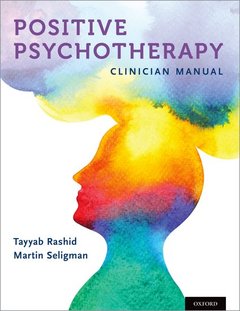Description
Positive Psychotherapy
Clinician Manual
Authors: Rashid Tayyab, P. Seligman Martin
Language: English
Subjects for Positive Psychotherapy:
61.17 €
In Print (Delivery period: 21 days).
Add to cart
Publication date: 09-2018
376 p. · 21.7x28 cm · Paperback
376 p. · 21.7x28 cm · Paperback
Description
/li>Biography
/li>
For over a century the focus of psychotherapy has been on what ails us, with the therapeutic process resting upon the assumption that unearthing past traumas, correcting faulty thinking, and restoring dysfunctional relationships is curative. And indeed, they are - but in the rush to identify and reduce symptoms of mental disorder, something important has been overlooked: the positives. Should enhancing well-being, and building upon character strengths and virtues, be explicit goals of therapy? Positive Psychotherapy provides therapists with a session-by-session therapeutic approach based on the principles of positive psychology, a burgeoning area of study examining the conditions and processes that enable individuals, communities, and institutions to flourish. This clinician's manual begins with an overview of the theoretical framework for positive psychotherapy, exploring character strengths and positive psychology practices, processes, and mechanisms of change. The second half of the book is contains 15 positive psychotherapy sessions, each complete with core concepts, guidelines, skills, and worksheets for practicing skills learned in session. Each session also includes at least one vignette as well as discussion of cross-cultural implications. Mental health professionals of all orientations will find in Positive Psychotherapy a refreshing alternative to symptom-based approaches that will endow clients with a sense of purpose and meaning that many have found lacking in more traditional therapies.
Tayyab Rashid is a licensed clinical psychologist and an associate faculty at the University of Toronto Scarborough, Canada, and has expertise in Positive Psychology interventions, resilience and post-traumatic growth. He is the recipient of the Outstanding Practitioner Award from the International Positive Psychology Association. Dr. Martin E.P. Seligman is the Director of the Penn Positive Psychology Center and Zellerbach Family Professor of Psychology in the Penn Department of Psychology. He is also Director of the Penn Master of Applied Positive Psychology program (MAPP). He was President of the American Psychological Association in 1998, during which one of his presidential initiatives was the promotion of Positive Psychology as a field of scientific study. He is a leading authority in the fields of Positive Psychology, resilience, learned helplessness, depression, optimism and pessimism. He is also a recognized authority on interventions that prevent depression, and build strengths and well-being. He has written more than 300 scholarly publications and 25 books.
© 2024 LAVOISIER S.A.S.
These books may interest you

Positive PsychotherapyWorkbook 43.23 €



